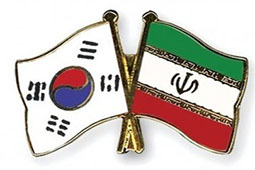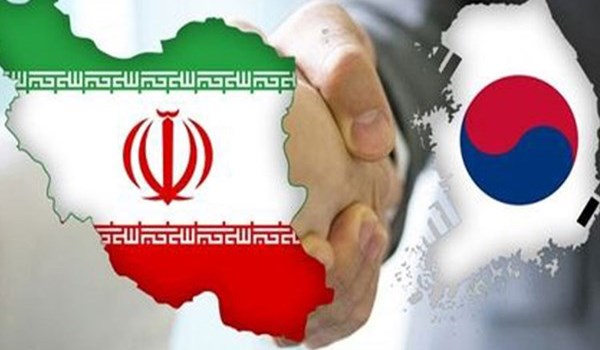
Seoul Resolute to Boost Cooperation with Tehran


Yo Jang Hyan said on Saturday that the relations between two countries have faced some problems created by re-imposition US sanctions.
"Both countries have deep relations, he said, adding," We stood by Iran during 1980-1988 Iran-Iraq war.
"We have had friendly and close cooperation with Iran over the recent years," the South Korean diplomat said.
He went on to say that South Korea has been exempted from the US sanctions.
"Accordingly, we aim to have more cooperation and activities," Jang Hyan reiterated.
Korean envoy referred to Iran-South Korea trade exchanges volume last year which hit $12b, saying due to the US withdrawal from Iran nuclear deal, also known as the Joint Comprehensive Plan of Action (JCPOA), the figure will experience sharp decline this year.
In response to another question on purchasing Iran oil, Jang Hyan said the relations between Iran and South Korea is so deep that sanctions will have no effect on them.
Elaborating on the South Korean companies' presence in Iran, he said, "We trust Iranian market so Korean firms will definitely stay in Iran."
Jang Hyan pointed to holding South Korean film week in Tehran, the seventh South Korean film festival will be held with the attendance of eight movies.
In addition to economic and political fields, Iran and South Korea enjoy close cooperation in cultural, social and sports sectors, he said.
Earlier on November 19, South Korean Ambassador to Iran Ryu Jeong-hyun said his country is determined to keep doing trade with Iran despite US pressures, and reassured that Iran will overcome the US unilateral sanctions.
Hailing Tehran-Seoul diplomatic relations dating back to 1962, South Korean envoy in Iran ascertained that the two countries can proceed with commercial relations.
The diplomat made the remarks during his visit to Iranian northern city of Rasht where he met with the members of the city council and told them that, “Iran will surely overcome unilateral sanctions.”
Noting that South Korea has been exempted from Iran-related sanctions, he noted that his country can continue trade with Iran and buy oil from it.
“Ties might not be good at present. But I promise you they will be excellent in the future,” he said.
"Mutual cooperation cannot be limited to merely importing oil from Iran; rather they can be promoted to global and regional spheres," he said.
Referring to Ramsar protocol, the envoy said that the protocol maintains that Iran pays due attention to environmental issues.
“I will do all within my power to overcome problems faced by the two countries in the field of environment and global issues,” he said.
“I will support a sisterhood agreement between Rasht and one of the South Korean cities,” he said, noting that Rasht is one of the Iranian pioneer cities in the field of culture and agriculture.
Head of Rasht Council Seyed Amirhossein Alavi, for his part, said that mutual interactions will surely benefit both sides.
He also voiced willingness for exchanging experience and using South Korean capacities in all fields, particularly environment.
On November 07, Iran and South Korea reached an agreement to use South Korean national currency (won) in bilateral trade to bypass the US sanctions.
A day before that, the US announced South Korea, along with seven other countries, will be granted waivers on Iranian crude oil purchases. US exemptions were later extended to include Iraq and Afghanistan, making a total of 10 countries excused from US consequences.
On November 12, The Southern Iranian province of Bushehr and a South Korean trade and commercial delegation signed five memoranda of understanding (MoUs) to boost bilateral relations and mutual cooperation between the two countries.
The waiver would enable South Korean refiners to continue the purchase of Iranian condensate, which is ultralight oil used for various petrochemical products, according to South Korean news agency Yonhap.
Following the waiver South Korean Vice Minister of Trade, Industry and Energy Cheong Seung-il, said the move has “considerably eased uncertainties surrounding trade with Iran", adding that the Korean government will “continue to provide liquidity assistance to small and medium-sized companies experiencing difficulties doing business with Iran and explore alternative markets", according to Yonhap.
Yonhap went on to add that the two sides will restart the won-based settlement of bilateral trade transactions via the Central Bank of Iran (CBI)'s accounts at two South Korean banks: Woori Bank and the Industrial Bank of Korea (IBK).
The news agency quoted a source as saying that “it’s expected to provide South Korean firms with more opportunities for the trade of non-sanctions data-x-items such as medical products, processed food and home appliances, although the exports of some products including steel and automobile parts will be affected by the sanctions.”
South Korea is the third-largest buyer of Iranian oil after China and India.
South Korea has broad economic relations with Iran and is also a big buyer of oil and gas products from Iran. Seoul was among the first 8 countries which the US exempted from the unilateral sanctions of Washington against Tehran.
South Korean officials in numerous occasions have reiterated the resolute will of their country to expand bilateral ties with Iran and a in a related front in February, South Korea's Ambassador to Tehran Kim Seung Ho underscored that Seoul supports the Korean companies' further cooperation and investment in Iran.
"The strategy of the South Korean government is based on further consolidation of ties between the two countries and the government is highly willing to see the Korean companies' cooperation and investment in Iran," Kim said, addressing economic activists in Iran's Northern province of Semnan on Sunday night.
He reminded dependence of his country's economy to the oil industry, and said Iran is the second supplier of South Korea's oil resources.
Kim also stressed further strengthening of relations between Tehran and Seoul.


Trump weighs using $2 billion in CHIPS Act funding for critical minerals

Codelco cuts 2025 copper forecast after El Teniente mine collapse

Electra converts debt, launches $30M raise to jumpstart stalled cobalt refinery

Barrick’s Reko Diq in line for $410M ADB backing

Abcourt readies Sleeping Giant mill to pour first gold since 2014

Nevada army depot to serve as base for first US strategic minerals stockpile

SQM boosts lithium supply plans as prices flick higher

Viridis unveils 200Mt initial reserve for Brazil rare earth project

Tailings could meet much of US critical mineral demand – study

Kyrgyzstan kicks off underground gold mining at Kumtor

Kyrgyzstan kicks off underground gold mining at Kumtor

KoBold Metals granted lithium exploration rights in Congo

Freeport Indonesia to wrap up Gresik plant repairs by early September

Energy Fuels soars on Vulcan Elements partnership

Northern Dynasty sticks to proposal in battle to lift Pebble mine veto

Giustra-backed mining firm teams up with informal miners in Colombia

Critical Metals signs agreement to supply rare earth to US government-funded facility

China extends rare earth controls to imported material

Galan Lithium proceeds with $13M financing for Argentina project

Kyrgyzstan kicks off underground gold mining at Kumtor

Freeport Indonesia to wrap up Gresik plant repairs by early September

Energy Fuels soars on Vulcan Elements partnership

Northern Dynasty sticks to proposal in battle to lift Pebble mine veto

Giustra-backed mining firm teams up with informal miners in Colombia

Critical Metals signs agreement to supply rare earth to US government-funded facility

China extends rare earth controls to imported material

Galan Lithium proceeds with $13M financing for Argentina project

Silver price touches $39 as market weighs rate cut outlook

















